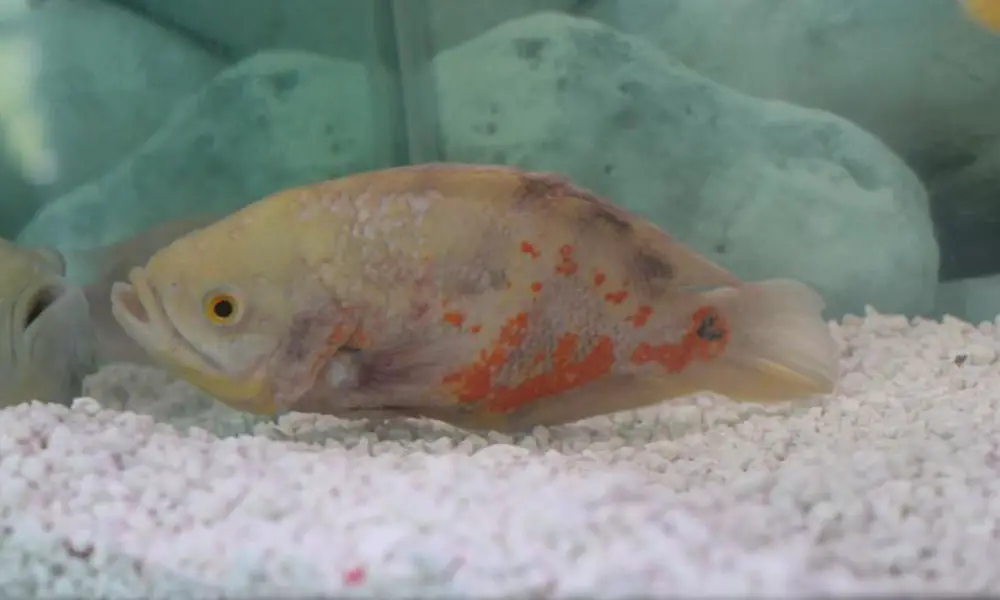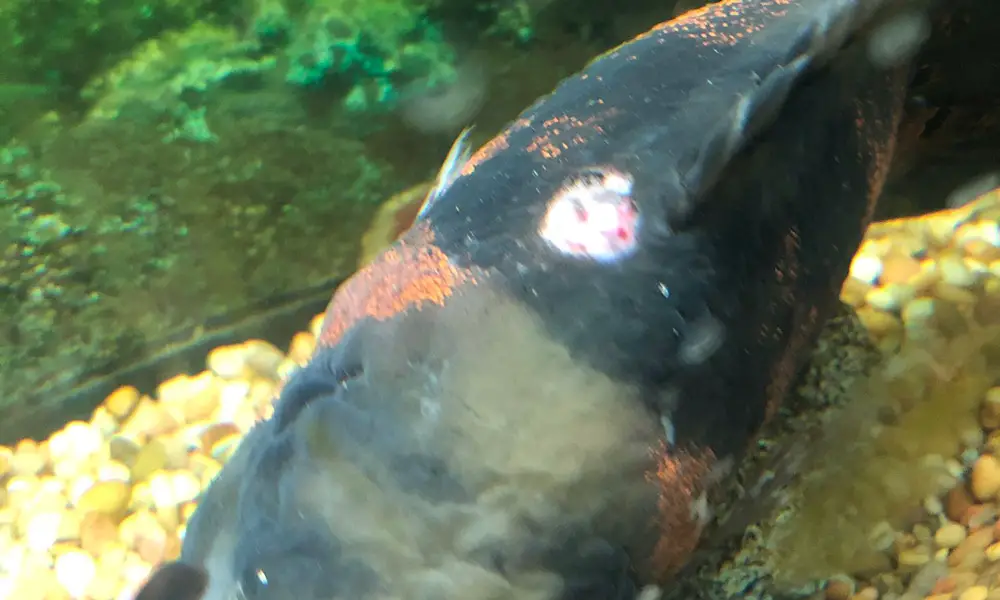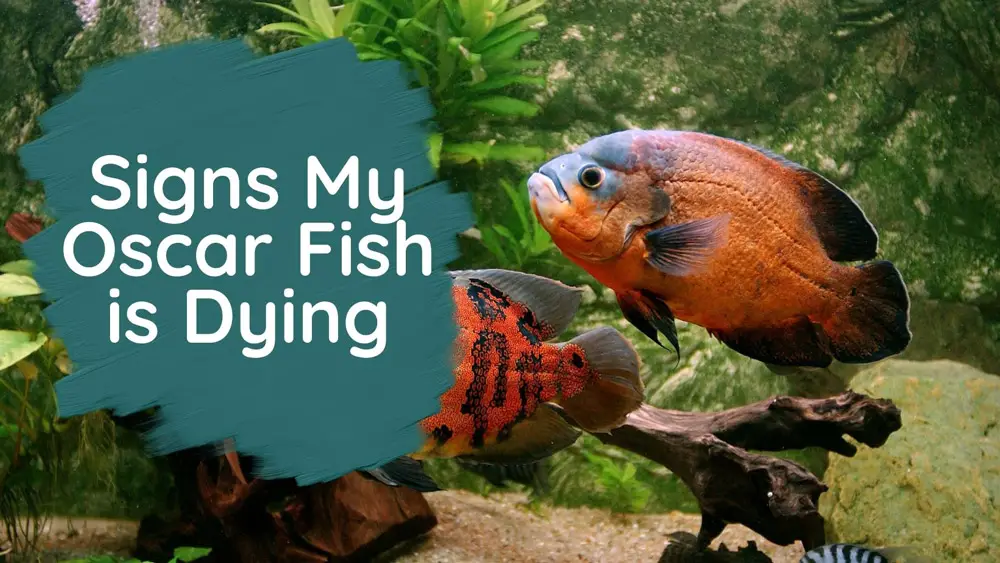The Oscar fish is a tough competitor in the aquarium world. Although generally hardy, the Oscar is susceptible to many diseases and parasites. You should be able to recognize if your fish has a disease or parasite in order to start treatment sooner rather than later.
To avoid worst-case scenarios and save them before it’s too late, here are signs my Oscar fish is dying and in need of immediate medical care.
How to Tell If My Oscar fish is Dying?
The first thing to note is your Oscar’s appearance and behavioral patterns. Are there any sudden changes? Remember that no one fish is the same.
While subtle changes may mean nothing, noticeable changes are cause for alarm.
Apart from being visually sick, the aquarium also provides me with significant signs that my Oscar fish might be deteriorating.
Behavioral Changes of a Sick Oscar Fish

Loss of Appetite
Fish spend most of their life eating; thus, this is a sure way to measure your Oscar fish’s well-being.
Like other Oscar fish, my tiger Oscars are gluttons, and they tend to even beg for more after feeding. So, a decline in appetite, whether sudden or gradual, may mean that they’re distressed or ailing.
Loss of Awareness
I once had an Albino Oscar who loved showing off his colorful scales in his 75-gallon tank. He even kept re-arranging the rocks until they weren’t visually appealing anymore.
Oscar fish are personable, so when you notice they start losing vitality, there might be something wrong. It’s best to find out the cause immediately. It may be the water temperature or their diet or a sudden change in their environment stressing them out.
Loss of Balance or Buoyancy
Buoyancy refers to a fish’s inability to control sinking and floating. Oscar fish tend to lie down to their sides on the bottom of the tank when agitated, and this is normal. What’s not normal is if they don’t shoot back up instantly or remain less responsive than usual once stimulated.
Oppositely, I have seen cases where they had trouble sinking, only floating almost at the surface of the tank. Sometimes, they even float upside down or on their sides. These are symptoms that usually point to a swim bladder disease.
Increased Respiratory Rate
Just like people, Oscar fish hyperventilate when in distress too. My veterinarian gave me some tips to check an Oscar fish’s pulse. You have to count the times their gill covers, their Opercula, move. Any hint of labored breathing or a respiratory ailment should be dealt with immediately.
Appearance Changes of a Dying Oscar Fish

Hole in the Head
Hole in the Head (HITH) is one of the easily recognizable diseases of Oscar fish. The usual symptoms would be white sores on top of the head, around the eyes, or both.
Some other things to look out for are:
- Deep cuts and grazes on the head and lateral line
- Mucus coming out of its holes
- Loss of appetite
I recommend consulting your veterinarian to find what kind of treatment your Oscar would need. For reference, I used Flagyl (metronidazole) to treat one of my Tiger Oscars.
Skin & Fins
If your Oscar develops tattering and blackening or reddening of its fins, including blood, then it is a cause for concern. These could be symptoms of Columnaris Disease, more commonly known as Fin and Tail Rot.
Other symptoms to check are parts of the fin are tearing off, the body looking slimy, skin having white spots, or behavioral abnormalities like appetite loss and sitting on the bottom of the tank.
‘Fish and Tail Rot’ is caused by bacterial contamination; thus, it needs antibiotics, or in worse cases, surgery. Ich, caused by a rapidly producing parasite, can be treated at home, but Aquarist must follow specific instructions.
Also, if you notice white spots on the skin or gills, then this could be Ich or white spot disease,which is usually fatal if not promptly treated.
Eyes
I always look out for swollen or bulging eyes from my Tiger Oscars. It could be a sign of Popeye Disease caused by poor water management in the tank.
Popeye disease, although treatable, can cause permanent damage like blindness in the affected eye.
Body Shapes
Swollen stomach bumps, erratic swimming, a belly that appears bloated can spell several issues for your Oscar fish. It can range from constipation to Swim Bladder Disease to the more serious Dropsy.
While constipation may be better by improving diet, water conditions, and temperature, Swim Bladder Disease and Dropsy are more complicated. At-home treatment of dropsy is not often successful. Consult your local vet for advice on how best to handle this condition!
Tank Signs of a Dying Oscar fish
Cloudy Water
Despite your efforts in cleaning the tank, the water remains cloudy. Why? One word: Bacteria.
When uneaten food breaks down and decomposes into the water, it becomes a breeding ground for bacteria. It makes the water hazy because it’s full of bacteria.
Initially, these bacteria are harmless, especially to the resilient Oscar fish. However, too much can cause distress to the Oscar Fish and make it fatally sick.
Author note: When setting up a new aquarium, it is common for the water to become cloudy. This happens because of beneficial bacteria that convert ammonia and nitrites into less harmful compounds.
Protein Foam
Waste-causing protein is one of the more harmful bubbles in aquariums. The often-smelly foam can be from several reasons:
- Dead fish – Dispose of fish debris that may have been from feeding
- Dead plants – Little bits of tank plants that are decaying
- Other Waste and left-over food – Often sitting at the bottom of the tank
- Dirty filter – Buildup of remains caught by your filter
I always check small spaces like decorations where debris may settle and hide. Oscars are known for being messy eaters, so I recommend getting their extra aquarium filters.
Uneaten or Excess Food
An Oscar is an aggressive eater. If you can find food sitting on the bottom of the tank, then it might mean a decreased appetite for your fish, or you are giving them too much.
Prolonged overfeeding and mismanagement of their diet can easily lead to many health complications.
Dead Specimens
Other than protein, decaying fish release harmful toxins. These include ammonia, which can harm tank mates. If the deceased fish died of an illness, it would be wise to observe its tank mates closely in case they develop similar symptoms.
After removing the fish, I recommend sanitizing all the equipment used. I also perform a deep clean of the tank for additional protection.
Final Thoughts
Oscars are a great fish for first-time tank owners to get. With careful attention and knowledge about their needs, you can prevent most of these diseases from happening in your aquarium!
I hope this article has helped. If you have any questions or feedbacks, feel free to contact me below.
